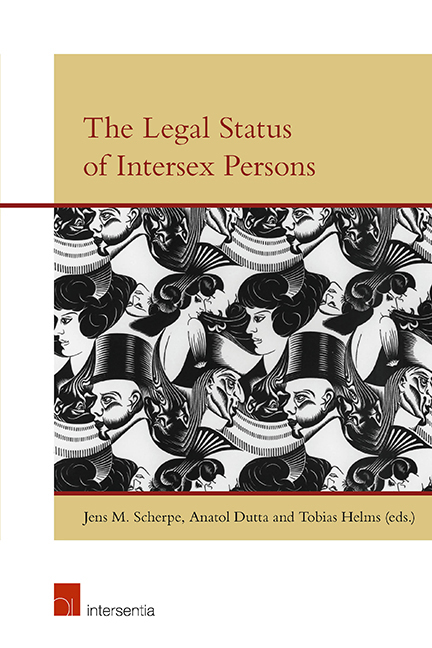Book contents
- Frontmatter
- Preface
- Contents
- List of Contributors
- The Legal Status of Intersex Persons: An Introduction
- Malta Declaration
- Darlington Statement
- Vienna Statement
- PART I MEDICINE AND PSYCHOLOGY
- PART II THEOLOGY AND LEGAL HISTORY
- PART III TRANSGENDER, TRANSSEXUALITY AND INTERSEX
- Lessons from the Legal Development of the Legal Status of Transsexual and Transgender Persons
- Towards Trans and Intersex Equality: Conflict or Complementarity?
- PART IV NATIONAL LEGAL DEVELOPMENTS
- PART V PRIVATE INTERNATIONAL LAW ASPECTS OF INTERSEX
- PART VI INTERSEX AND HUMAN RIGHTS
Lessons from the Legal Development of the Legal Status of Transsexual and Transgender Persons
from PART III - TRANSGENDER, TRANSSEXUALITY AND INTERSEX
Published online by Cambridge University Press: 31 January 2019
- Frontmatter
- Preface
- Contents
- List of Contributors
- The Legal Status of Intersex Persons: An Introduction
- Malta Declaration
- Darlington Statement
- Vienna Statement
- PART I MEDICINE AND PSYCHOLOGY
- PART II THEOLOGY AND LEGAL HISTORY
- PART III TRANSGENDER, TRANSSEXUALITY AND INTERSEX
- Lessons from the Legal Development of the Legal Status of Transsexual and Transgender Persons
- Towards Trans and Intersex Equality: Conflict or Complementarity?
- PART IV NATIONAL LEGAL DEVELOPMENTS
- PART V PRIVATE INTERNATIONAL LAW ASPECTS OF INTERSEX
- PART VI INTERSEX AND HUMAN RIGHTS
Summary
AN ‘I’ IS NOT A ‘T’
The voice of intersex persons has been unheard for a long time. Also, often this voice was absorbed into the wider chorus of the voices of the LBGT movement. But an ‘I’ is not ‘T’ (and not an ‘L’, ‘G’ or ‘B’ either). Intersex is about experience of body, and trans about experience of gender (and neither are about sexual orientation). It is important to point out right at the outset of this chapter that the legal issues concerning intersex people are different from those of trans individuals and must be dealt with, as a matter of urgency, as a distinct issue and not merely as a part of the debate of other issues, even though they may be or may seem to be related.
However, recently trans individuals have been become much more visible in society, and legal issues surrounding them have received much greater (and indeed much needed) attention. Significant progress has been made with regard to their rights and recognition in many jurisdictions. The same has yet to happen for intersex persons. While acknowledging the differences between the two groups, this chapter suggests that some lessons can be learned from the paths that were taken to achieve this progress. The chapter by Peter Dunne in this volume will also explore this topic, so this chapter will be based on the findings and recommendations of another research project (which resulted in the publication of the book The Legal Status of Transsexual and Transgender Persons) and how they can be made fruitful for the present context.
One of the key things the comparison and analysis for the transgender project brought to light was the importance of continuous and consistent activism, and also the importance of certain individuals in bringing about change. But what was also shown were ‘phases’ or stages in the development of the law concerning transsexual and transgender persons. It is very likely that we will see (and indeed are seeing) those mirrored for intersex – although it is to be hoped that the development will be much quicker and more efficient.
- Type
- Chapter
- Information
- The Legal Status of Intersex Persons , pp. 203 - 216Publisher: IntersentiaPrint publication year: 2018



